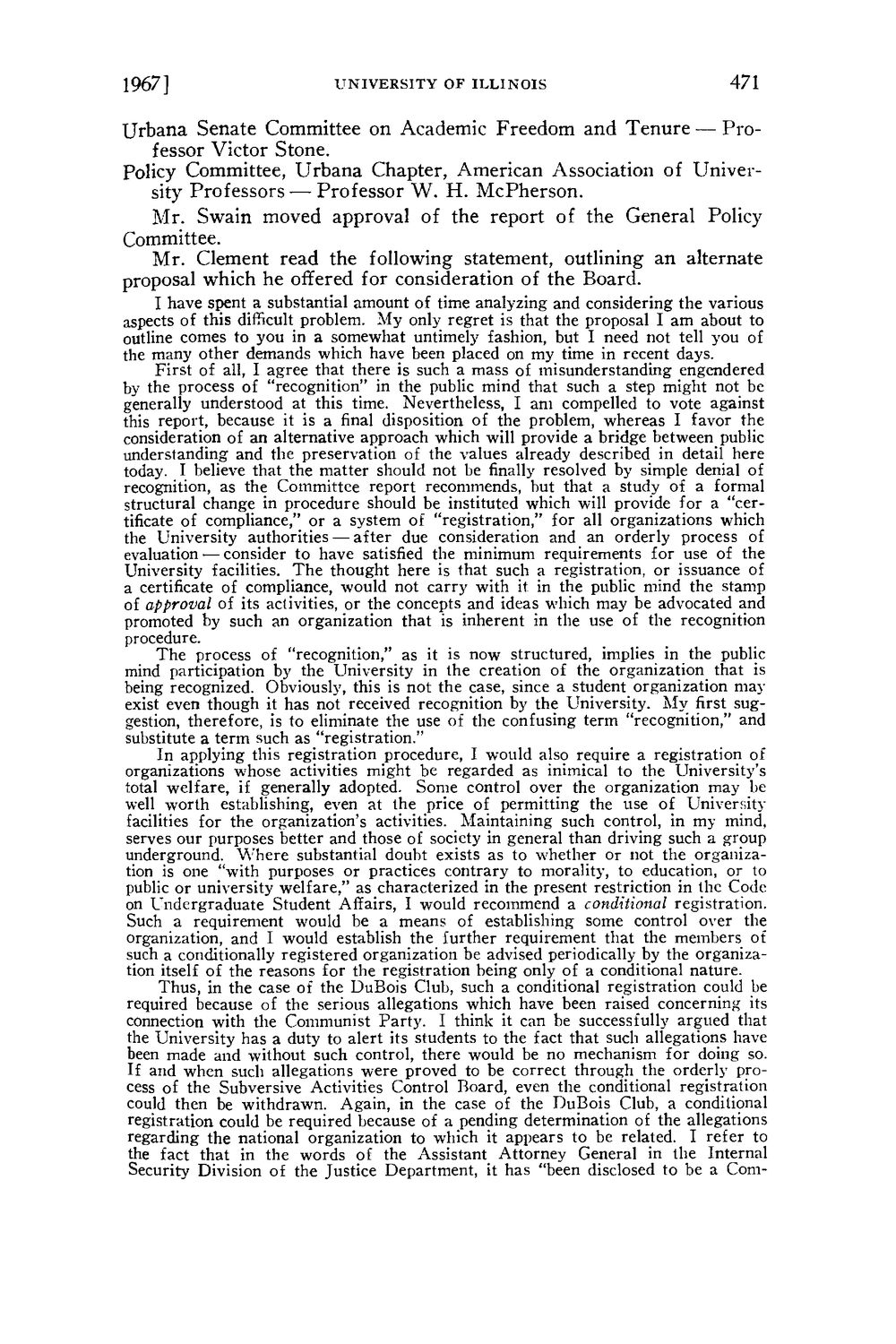| |
| |
Caption: Board of Trustees Minutes - 1968
This is a reduced-resolution page image for fast online browsing.

EXTRACTED TEXT FROM PAGE:
1967] U N I V E R S I T Y OF I L L I N O I S 471 Urbana Senate Committee on Academic Freedom and Tenure — Professor Victor Stone. Policy Committee, Urbana Chapter, American Association of University Professors — Professor W. H. McPherson. Mr. Swain moved approval of the report of the General Policy Committee. Mr. Clement read the following statement, outlining an alternate proposal which he offered for consideration of the Board. I have spent a substantial amount of time analyzing and considering the various aspects of this difficult problem. My only regret is that the proposal I am about to outline comes to you in a somewhat untimely fashion, but I need not tell you of the many other demands which have been placed on my time in recent days. First of all, I agree that there is such a mass of misunderstanding engendered by the process of "recognition" in the public mind that such a step might not be generally understood at this time. Nevertheless, I am compelled to vote against this report, because it is a final disposition of the problem, whereas I favor the consideration of an alternative approach which will provide a bridge between public understanding and the preservation of the values already described in detail here today. I believe that the matter should not be finally resolved by simple denial of recognition, as the Committee report recommends, but that a study of a formal structural change in procedure should be instituted which will provide for a "certificate of compliance," or a system of "registration," for all organizations which the University authorities — after due consideration and an orderly process of evaluation •— consider to have satisfied the minimum requirements for use of the University facilities. The thought here is that such a registration, or issuance of a certificate of compliance, would not carry with it in the public mind the stamp of approval of its activities, or the concepts and ideas which may be advocated and promoted by such an organization that is inherent in the use of the recognition procedure. The process of "recognition," as it is now structured, implies in the public mind participation by the University in the creation of the organization that is being recognized. Obviously, this is not the case, since a student organization may exist even though it has not received recognition by the University. My first suggestion, therefore, is to eliminate the use of the confusing term "recognition," and substitute a term such as "registration." In applying this registration procedure, I would also require a registration of organizations whose activities might be regarded as inimical to the University's total welfare, if generally adopted. Some control over the organization may be well worth establishing, even at the price of permitting the use of University facilities for the organization's activities. Maintaining such control, in my mind, serves our purposes better and those of society in general than driving such a group underground. Where substantial doubt exists as to whether or not the organization is one "with purposes or practices contrary to morality, to education, or to public or university welfare," as characterized in the present restriction in the Code on Undergraduate Student Affairs, I would recommend a conditional registration. Such a requirement would be a means of establishing some control over the organization, and I would establish the further requirement that the members of such a conditionally registered organization be advised periodically by the organization itself of the reasons for the registration being only of a conditional nature. Thus, in the case of the DuBois Club, such a conditional registration could be required because of the serious allegations which have been raised concerning its connection with the Communist Party. I think it can be successfully argued that the University has a duty to alert its students to the fact that such allegations have been made and without such control, there would be no mechanism for doing so. If and when such allegations were proved to be correct through the orderly process of the Subversive Activities Control Board, even the conditional registration could then be withdrawn. Again, in the case of the DuBois Club, a conditional registration could be required because of a pending determination of the allegations regarding the national organization to which it appears to be related. I refer to the fact that in the words of the Assistant Attorney General in the Internal Security Division of the Justice Department, it has "been disclosed to be a Com-
| |